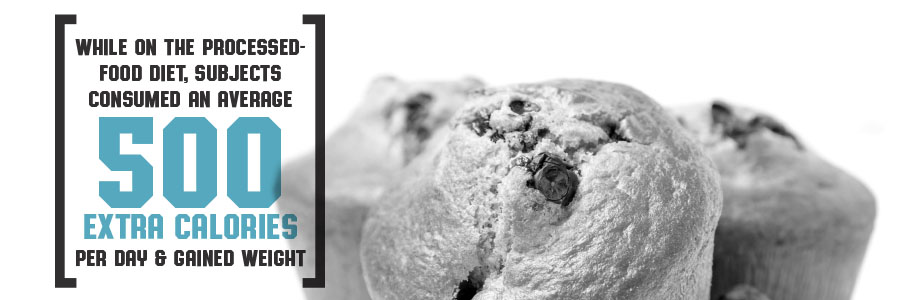


Sign-up for {N}power to get exclusive discounts, newsletters, members-only features, and more!
 Denver - Design District - Alameda and Broadway
Denver - Design District - Alameda and Broadway
368 S Broadway
Denver, CO 80209
United States
 Preferred Store:
Select a Store
Preferred Store:
Select a Store


New researched published in the journal Cell Metabolism showed that people who ate a diet comprised of processed food consumed more calories and gained weight compared to those who consumed a diet of unprocessed foods. The processed-food diet included foods like breakfast cereals, muffins, white bread, low-fat yogurts, low-fat potato chips, processed meats, fruit juices, and diet drinks. This diet was shown to cause an increase in hunger hormones and caused subjects to consume more calories than the diet of unprocessed foods, which included fresh fruits and vegetables, eggs, chicken, fish, beef, whole grains, nuts, and seeds.
The study, conducted by the National Institutes of Health, recruited participants for a four-week period in which they consumed the processed diet or the unprocessed diet for two weeks and then alternated halfway through the study. While both diets offered similar calories, fiber, and salt the subjects were instructed to consume as much or as little as they desired for all of their meals and snacks. While on the processed-food diet, subjects consumed an average of 500 extra calories per day and gained weight over the two-week period of consuming the diet.
The researchers wrote, “Ultra-processed foods … now constitute the majority of calories consumed in America and have been associated with a variety of poor health outcomes, including death.”
Alternatively, eating a natural foods diet rich in vegetables, fruit, and lean meat can reduce depression symptoms. A study published late last year in the journal PLOS ONE including 76 university students between the ages of 17 and 35, found that just three weeks of following a healthy diet significantly decreased symptoms of depression. At the start of the study, the subjects had “moderate-to high” depression symptoms and ate diets high in processed foods. One group was instructed to follow a healthier diet that included five daily servings of vegetables, protein, dairy, nuts and seeds, olive oil, and spices for three weeks while decreasing their intake of refined carbs, sugar, fatty and processed meats, and soft drinks. At the end of three weeks, the group eating the healthier diet saw a significant improvement in mood, with their depression scores dropping to a normal range. They also had significantly lower anxiety scores compared to the control group.
Thiamine, also known as B1, is an essential B vitamin that plays important roles in cellular energy production and blood sugar regulation, both critical to cardiovascular health. A recent review published in Nutrition, Metabolism & Cardiovascular Diseases highlights the prevalence of thiamine deficiency in cardiovascular disease (CVD) and other correlated diseases, including diabetes, obesity, endothelial dysfunction, myocardial infarction, and heart failure. Thiamine deficiency can result from a variety of factors including decreased thiamine levels in food due to processing and cooking, consuming an excessive amount of refined carbohydrates and sugars, and excessive alcohol intake.
The researchers looked at the effects of thiamine supplementation and found that it had several benefits on CVD and its risk factors. One study that included 60 patients with type-2 diabetes saw a reduction in total cholesterol and LDL cholesterol after the subjects took 100 mg of thiamine daily for six months. Another study saw significant improvements in left ventricular ejection fraction, a factor in heart failure, after supplementing with 300 mg of thiamine daily for four weeks. The review highlights thiamine deficiency’s potential role in the development of CVD and related diseases and provides evidence that more research should be done on thiamine’s potential in reversing CVD and its risk factors.



Sign-up for {N}power to get exclusive discounts, newsletters, members-only features, and more!
